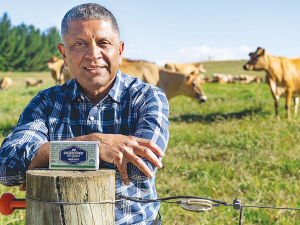Indian FTA 'opens doors for dairy'
A New Zealand dairy industry leader believes the free trade deal announced with India delivers wins for the sector.
 Southern Pastures and Lewis Road Creamery executive chairman Prem Maan says they’ve done their best to make the butter as affordable as possible.
Southern Pastures and Lewis Road Creamery executive chairman Prem Maan says they’ve done their best to make the butter as affordable as possible.
Specialty butter made from New Zealand grass-fed milk is now available locally after sales success in the US over the past two years.
The Lewis Road Creamery (LRC) butter is made from milk sourced only from farms owned by the parent company Southern Pastures and meets stringent and independently audited 10 Star certified values that cover grass-fed, free-range, animal welfare, human welfare, GMO-free, PKE-free, environmental sustainability, and climate change mitigation criteria.
In 2020, the butter became the first, and remains the only, New Zealand dairy product to be stocked US-wide by Whole Foods, owned by Amazon.
It is one of the most expensive butter available in the US where a 227g pat retails around NZ$10. However, the recommended retail price in NZ is $7.49.
The butter is produced at Fonterra's Morrinsville plant.
Southern Pastures and LRC executive chairman Prem Maan told Dairy News that people often ask when they will be able to buy "the best butter in the world locally".
"We've done our best to make the butter as affordable and we hope Kiwis will enjoy butter made at home from grass-fed milk."
Maan says the LRC butter has better taste and colour because it's free of GMO products and imported feed.
Maan says the lower price for NZ consumers is to acknowledge the butter's local provenance and the reduced transport costs of selling it here at home.
"We believe that New Zealanders with discerning palates and with an interest in genuine sustainability will support us, knowing that we are investing back into our land, soil and water."
Southern Pastures owns and operates 20 farms in Waikato and Canterbury.
"The reality is that it costs a lot to farm the way that we do," says Maan.
"For example, at least 34c of every pat of butter is directly related to environmental sustainability and climate change mitigation costs incurred on-farm, and these are just 2 of our 10 values in our 10 Star Certified Values program."
Southern Pastures' cows are fed a 99% grass and forage-based diet which is GMO free - the default position in NZ where it is still illegal to grow GMO crops.
The diet is PKE-free, a decision the company says will preserve global biodiversity, reduce its carbon footprint, and also to provide the healthiest dairy possible.
"We don't feed our cows cheap imported feed to pump upmilk production when we have low seasonal grass growth.
"So, we invest in growing, storing and feeding out a proper locally grown forage-based diet, as we believe that is one of the requirements for sustainable farming," says Maan.
Southern Pastures is also investing heavily in native plantings, soil sequestration of carbon and other greenhouse gas initiatives.
Maan says this is part of a strategy to have the portfolio of farms strive to achieve carbon-neutral - and eventual climate-positive status - through farming practices, rather than simply buying carbon-neutral - and eventual carbon-positive status - through farming practices, rather than simply buying carbon credits generated through planting exotic mono-culture forests on productive land.
"In the US we've been able to command our premium due to thses sustainability measures, and also the exceptional quality of the butter and its nutritional profile - for example, its high Omega 3 to Omega 6 beneficial ration," says Maan.
He says the butter has been endorsed in the US by top chefs and celebrities.
Sale of the butter in the US has been increasing despite a drop in category sales.
Horticulture New Zealand (HortNZ) has added its perspective to numerous primary sector voices urging the Government to strengthen its draft legislation to replace the Resource Management Act (RMA).
The Commerce Commission has finalised new information disclosure requirements for local councils and water organisations that deliver water supply and wastewater services.
Beef + Lamb NZ (B+LNZ) is calling for significant changes to the Government’s reforms to the Resource Management Act (RMA).
NZPork says the Government needs to strengthen its proposed planning laws to ensure New Zealand's pig farmers can continue to produce pork.
Good news for kiwifruit growers - a record crop with forecast per hectare returns at record levels for all fruit categories for the 2025-26 season.
As guests gathered on what is known as the Speaker's Lawn - a beautifully manicured patch of grass behind the main buildings of Parliament - to mingle and enjoy a lamb chop to celebrate National Lamb Day, the mood was very much upbeat.
OPINION: Staying with politics, with less than nine months to go before the general elections, there’s confusion in the Labour…
OPINION: Winston Peters' tirade against the free trade deal stitched with India may not be all political posturing by the…